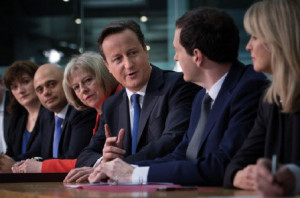What does a Conservative government mean for the UK?

The Conservatives have a majority in the House of Commons, so this time their manifesto will not need to be adjusted as part of a coalition agreement
There’s a lot in the manifesto, so here we concentrate on the opening lines of their Economic Plan. To make it more digestible, here it is in bite-size pieces, complete with comments.
Our commitment to you:
Your job, your home, the mortgage you pay, the school your children go to, your local hospital,
your pension – all these things depend on a strong economy. So we will carry on working
through our long-term economic plan. We will:
– keep our economy secure by running a surplus so that we start paying down our debts
Basically this means reducing the amount the government has previously borrowed by spending less than the government receives in taxes. There is no magic here. It’s our money that’s being used to reduce borrowing. But as we will see, the government are also pledging to reduce taxation. For those slow on the uptake, this means that the only way the government can realistically run a surplus is to cut spending. This they will do – to the extent of £12bn apparently.
– increase the tax-free Personal Allowance to £12,500 and the 40p Income Tax threshold to
£50,000
For those not familiar with the UK tax system, personal taxation exists in layers. The (currently) first £10,600 of income (earned or unearned) is free of tax. The next £31,785 is taxed at 20%, then there’s a rate of 40% on the remainder. Unless you’re unlucky enough to earn more than £150,000 of taxable income, in which case there’s 45% payable on that.
The interesting thing here is that the progressive rise of the personal allowance (i.e. the £10,600) during the coalition years was inspired by their partners, the LibDems. Maybe the promise of £12,500 was a consequence of the popularity of that policy or perhaps it was in anticipation of another coalition.
Middle-income earners will be happy with the new higher rate threshold of £50,000. There is no mention of the fate of the 45% rate. The Conservatives never liked this and had already reduced it from 50%. Maybe it will disappear completely this time around?
– commit to no increases in VAT, National Insurance contributions or Income Tax
VAT is unpopular, and has slowly risen over the years. To promise no rise from 20% is small comfort to those who would like to see it falling. National Insurance is, to all intents and purposes, another income tax.
Past governments have managed to fudge their way out of tax promises by raising taxes elsewhere. It remains to be seen if this government is going to be true to their word as well as accurate.
– crack down on tax evasion and aggressive tax avoidance and ensure those who can afford to pay the most do
This has been said over and over again by successive governments. And, to be fair, they have had their shares of success. But as time passed, more and more tax avoidance schemes came to light, usually in the press.
This populist promise is intended to reassure the public that the Conservatives are not in cahoots with maverick entrepreneurs or well-paid tax advisers and their corporate clients. If they pull this one off, it will be a massive PR coup for them, as well as being good for the treasury.
– rebalance our economy, build a Northern Powerhouse and back elected metro mayors
This one might seem a little odd and out of place. Presumably it is intended to reassure people and organisations in the north of England that growth won’t just be concentrated in London. Quite what is meant by “rebalance our economy” and exactly how they intend to make it happen is beyond my understanding, and I am left wondering if this is no more than a soundbite, as it is a rather immeasurable promise.
– pursue our ambition to become the most prosperous major economy in the world by the 2030s
Of course.







